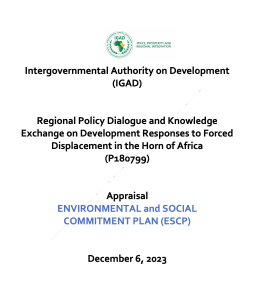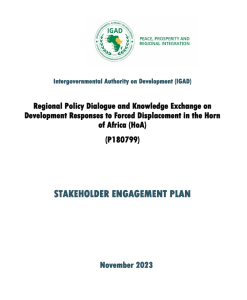 ENVIRONMENTAL AND SOCIAL COMMITMENT PLAN
ENVIRONMENTAL AND SOCIAL COMMITMENT PLAN
Intergovernmental Authority on Development (IGAD) (the Recipient) will implement the Regional Policy Dialogue and Knowledge Exchange on Development Responses to Forced Displacement in the Horn of Africa (P180127) (the “Project”). The World Bank (hereinafter the “The Bank”) acting as the administrator of Horn of Africa Initiative Umbrella Trust Fund, has agreed to provide financing for the Project.The Recipient shall ensure that the Project is carried out in accordance with the Environmental and Social Standards (ESSs) and this Environmental and Social Commitment Plan (ESCP), in a manner acceptable to the Bank. The ESCP is a part of the Financing Agreement. Unless otherwise defined in this ESCP, capitalized terms used in this ESCP have the meanings ascribed to them in the referred Financing Agreement.
Without limitation to the foregoing, this ESCP sets out material measures and actions that the Recipient shall carry out or cause to be carried out, including, as applicable, the timeframes of the actions and measures, institutional, staffing, training, monitoring, and reporting arrangements, and grievance management. The ESCP also sets out the environmental and social (E&S) instruments that shall be adopted and implemented under the Project, all of which shall be subject to prior consultation and disclosure, consistent with the ESS, and in form and substance, and in a manner acceptable to the Bank. Once adopted, said E&S instruments may be revised from time to time with prior written agreement by the Bank.
As agreed by the Bank and the Recipient, this ESCP will be revised from time to time if necessary, during Project implementation, to reflect adaptive management of Project changes and unforeseen circumstances or in response to Project performance. In such circumstances, the Recipient and the Bank agree to update the ESCP to reflect these changes through an exchange of letters signed between the Bank and the Recipient through the Executive Secretary. The Recipient shall promptly disclose the updated
Download the Environmental and Social Commitment Plan HERE
 STAKEHOLDER ENGAGEMENT PLAN
STAKEHOLDER ENGAGEMENT PLAN
The Intergovernmental Authority on Development (IGAD) is one of the Regional Economic Communities (RECs) and a pillar of African Union (AU). IGAD encompasses eight (8) Member States, namely Djibouti, Eritrea, Ethiopia, Kenya, Somalia, South Sudan, Sudan and Uganda. The IGAD region stretches over 5.2 million Km2 with an estimated population of 270 million inhabitants. The region hosts over 4.5 million refugee population, 12 million IDPs and a significant population of pastoralists and cross border mobile population.
In 1996, the Intergovernmental Authority on Development (IGAD) was established to assist and complement member States’ efforts to achieve peace, prosperity and regional integration and assist efforts of Member States to collectively combat drought and other natural and man-made disasters and their consequences through:
- Increased cooperation for food security and environmental protection.
Promotion and maintenance of peace and security and addressing humanitarian affairs. - Economic cooperation and integration as well as health social development.
The IGAD region is home to a variety of migrants from within and beyond the region. The population is estimated to reach 400 million by 2050. There are currently 261.25 million residents1. The population is spread across 5.2 million square km of land where about 80 percent of the landmass is arid and semi- arid land (ASAL)2.
Pastoralists account for approximately 20 percent of the IGAD’s population (approximately 50 million people), which has the highest livestock concentrations in the world. Pastoralists are nomadic and seek greener pastures and markets across international borders. Pastoralists have engaged in transhumance for decades in the absence of a national or regional framework that ensures pastoral mobility is conducted in a humane manner. To adapt to ASAL conditions, border communities had adapted their livelihood systems to agro-pastoralism. The mobility of pastoralists has posed difficulties, particularly in neighboring countries with limited access to resources such as water.
Download the Stakeholder Engagement Plan HERE

